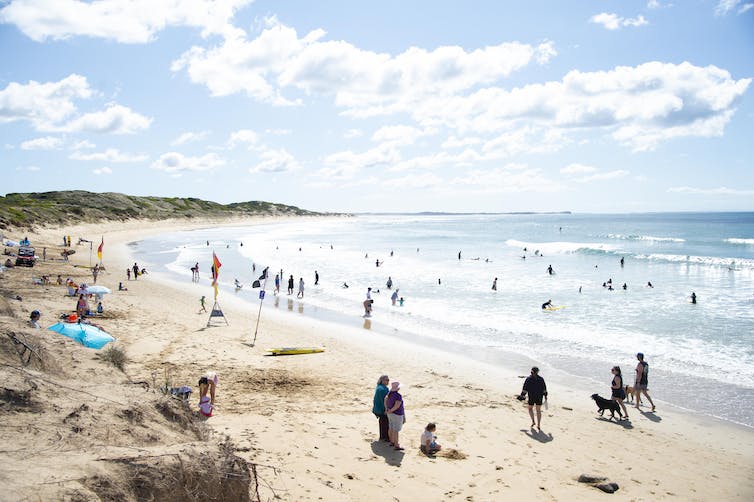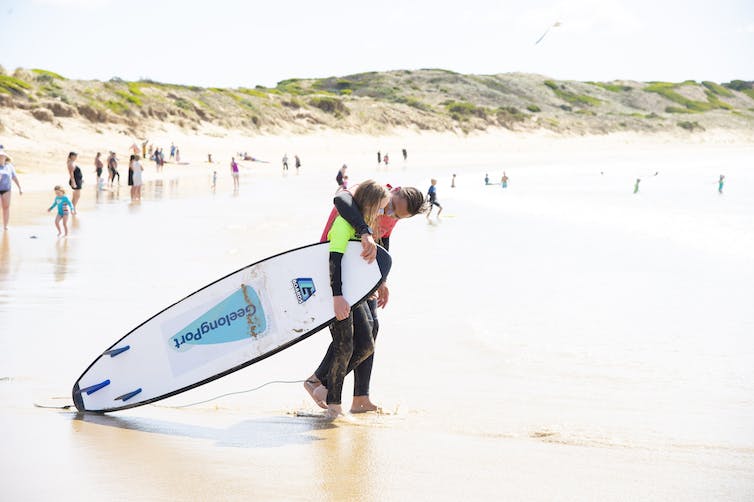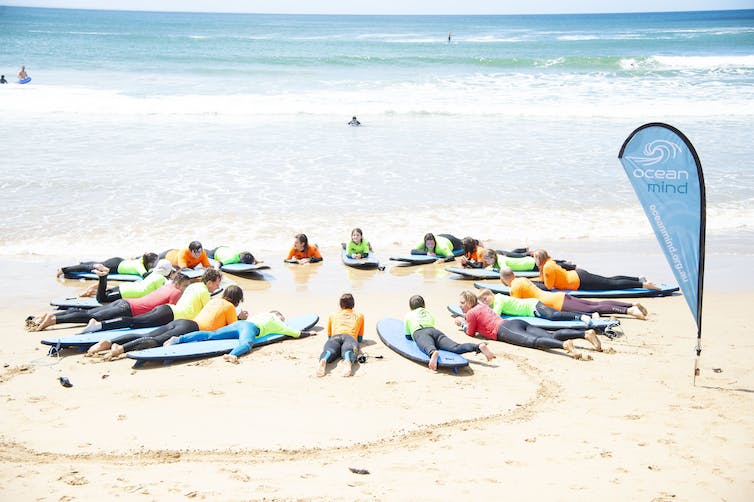Why learning to surf can be great for your mental health, according to a psychologist

Ferne Millen/Ocean Minds, Author provided
Nothing clears the mind like going for a surf. With the escapism and simplicity of riding waves, it’s no secret that surfing feels good.
Now our preliminary study in children and adolescents adds to growing evidence that surfing really is good for your mental health.
But you don’t have to have a mental illness to get the benefits. Here’s how you can use what we’re learning from our research to boost your own mental health.
Read more:
Big Wednesday: four decades between surfing and myth making
How surfing is good for you
Evidence showing the mental health benefits of surfing ranges from improving self-esteem and reducing social isolation to treating depression and other mental disorders.
Such evidence mainly comes from specific surf therapy programs. These combine supportive surfing instruction with one-to-one or group activities that promote psychosocial wellbeing.
At their core, most of these programs provide participants with the challenge of learning to surf in an emotionally safe environment.
Any benefits to mental health are thought to arise through:
an increased sense of social connection
a sense of accomplishment that people can transfer to other activities
respite from the day-to-day stressors due to the all-encompassing focus required when surfing
the physiological response when surfing, including the reduction of stress hormones and the release of mood-elevating neurotransmitters
exercising in a natural environment, in particular “blue spaces” (on or near water).

Exercising in a natural environment, near water, is part of the appeal.
Ferne Millen/Ocean Mind, Author provided
Read more:
Why going for a swim in the ocean can be good for you, and for nature
What we did
Our pilot study aimed to see whether the Ocean Mind surf therapy program improved child and adolescent mental health.
We also wanted to see whether participants accepted surfing as a way to address their mental health concerns.
The study involved 36 young people, 8–18 years old, who were seeking help for a mental health concern, such as anxiety, or a neurodevelopmental disorder (attention deficit hyperactivity disorder or autism spectrum disorder). They were referred by their mental health provider, GP or school counsellor.
Participants were allocated at random to the Ocean Mind surf therapy program or were placed on a waitlist for it. Those allocated to surf therapy continued with their usual care, which included case management from a mental health provider. Those on the waitlist (the control group) also continued with their usual care.
The surf therapy program ran for two hours every weekend for six weeks. Young people were partnered one-to-one with a community mentor who received training in mental health literacy and surf instruction.
Each session included supportive surf instruction and group mental health support, all conducted at the beach. Sessions were run by the program coordinator who was also trained in mental health and surf instruction.

Young people in the program were partnered with a mentor.
Ferne Millen/Ocean Mind, Author provided
What we found
By the end of the six-week program, those receiving surf therapy had reductions in depression, anxiety, hyperactivity and inattention symptoms, as well as fewer emotional and peer problems. This was compared with those in the control group, who had increases in these symptoms.
However, any improvements were not sustained six weeks after the program finished.
Those receiving surf therapy also saw it as a suitable, youth-friendly way to manage symptoms of mental ill-health. This was further supported by the high completion rates (87%), particularly when compared with other methods of mental health treatment. For instance, psychotherapy (talk therapy) has been reported to have a 28–75% drop-out rate for children and adolescents.
Read more:
Teen summer reads: 5 novels to help cope with adversity and alienation
It’s early days
These early findings are promising. But given this was a pilot study, more research is needed with larger numbers of participants to confirm these outcomes and see if they generalise to broader populations.
We’d like to identify the best dose of surf therapy in terms of session frequency, duration, and program length.
We also need to understand the factors that maintain these initial positive changes in mental health, so any benefits can be sustained after the program finishes.
The recognition of surfing as a potentially effective and acceptable mental health treatment among young people is also promising. But this finding does not preclude the more conventional clinical treatments, such as talk therapy and medication, which may work better for certain people.
Rather, surf therapy may be seen as an additional form of support alongside these approaches or an alternative for those who do not benefit from more traditional methods.

Surfers learn on land before heading into the ocean.
Ferne Millen/Ocean Mind, Author provided
Read more:
What can parents do about their teenagers’ mental health?
Tempted to try surfing?
If you think surfing might be for you, remember:
surfing requires complete focus due to the ever-changing conditions of the ocean, making it a great way to step away from day-to-day life and wipe out the effects of stress
for some people, surfing may reduce barriers to seeking mental health care
surfing may not be for everyone, nor can it guarantee to reduce your symptoms. Even the best surfers can suffer from depression and may require external support
don’t worry if you cannot access the ocean or a surfboard. Other nature-based activities, such as hiking and gardening, can also benefit your mental health.
If this article has raised issues for you, or if you’re concerned about someone you know, call Lifeline on 13 11 14 or Kids Helpline on 1800 55 1800.
![]()
Lisa Olive receives funding from the National Health and Medical Research Council and the Australian Government Department of Social Services. She does not work for, own shares in or receive funding from any company or organisation that would benefit from this article, including Ocean Mind, and has disclosed no relevant affiliations beyond her academic appointment.







